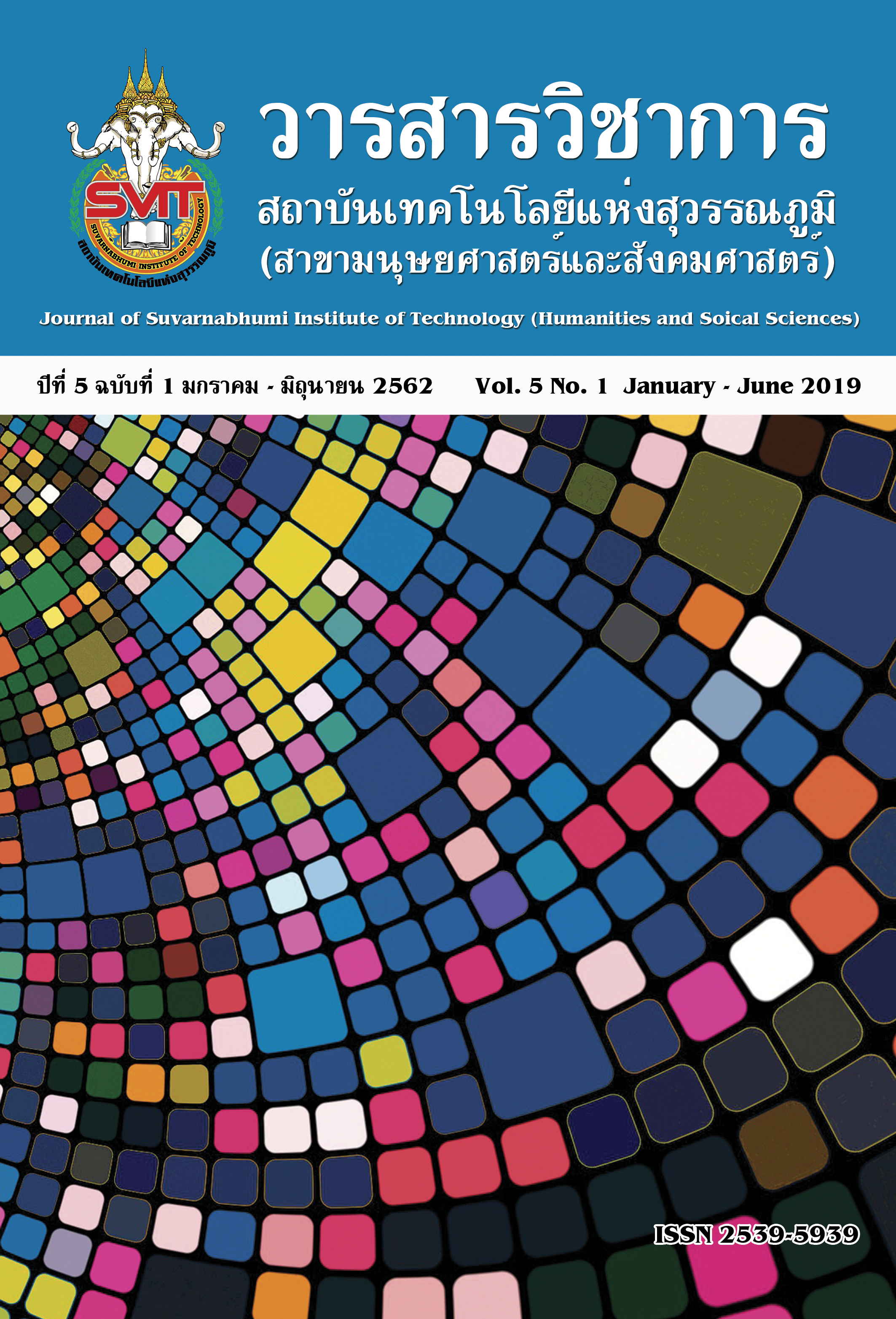EXPECTATIONS AND SATISFACTION OF FOUR AND FIVE-STAR HOTEL STAKEHOLDERS WITH DESIRED TRAITS OF HOSPITALITY GRADUATES FROM THE DEPARTMENT OF SERVICE INDUSTRY AND LANGUAGE INNOVATION AT KASETSART UNIVERSITY, KAMPANGSEAN CAMPUS FOCUSING ON HOUSEKEEPING SERVICES
Keywords:
Expectations, Satisfaction, Stakeholders, Hotel 4-5 star ratingAbstract
The purpose of the research was to investigate and the expectations and satisfaction of four and five-star hotel stakeholders with what was believe to be with Desired Traits of Hospitality Graduates from the Department of Service Industry and Language Innovation at Kasetsart University, Kampangsean Campus. The traits were those in housekeeping services. The research participants were selected 170 of 200 managers responsible for housekeeping services in 4-5 star hotels. The data was collected using questionnaires. The questions was design to reflect the managers’ expectations and satisfaction with the desired traits. In order to analyze the data, descriptive statistics including percentage, mean and standard deviation.
The results of this study are indicate as follows: (1) the results of the study of expectation levels among staff in the hospitality industry revealed that, in general terms, factors such as personality, theoretical knowledge, job and functional area knowledge, language skills, attitudes toward working in the hospitality industry, and morality and ethics were at a very satisfactory level. (2) The result of The study of satisfaction levels among staff in the hospitality industry also indicated that, in overall terms, personality, theoretical knowledge, job and functional area knowledge, language skills, attitudes toward working in the hospitality industry, and morality and ethics were at a very satisfactory level.
(3) Recommendations and guidelines for developing the desired traits are to reinforce skills for personality, expand theoretical knowledge and practical experiences, and strengthen ethics including language skill, working part time or internship in their area of study to gain direct experiences.
References
กิติภูมิ นิลจันทร์. แนวทางในการพัฒนาคุณลักษณะของบัณฑิตสาขาการโรงแรมด้านงานบริการส่วนหน้า. วิทยานิพนธ์ศิลปะศาสตร์มหาบัณฑิต. บัณฑิตวิทยาลัย มหาวิทยาลัยนเรศวร; 2555.
ชนะ กสิภาร์.คุณวุฒิวิชาชีพไทย/มาตรฐานอาชีพ. กรุงเทพฯ. ม.ป.ท. 2546.
ธีรวัตน์ อิ่มประคองศิลป์. คุณลักษณะที่พึงประสงค์ของนักศึกษาฝึกงานตามทัศนะผู้บริหารระดับกลางของสถานประกอบการด้านโรงแรมในกรุงเทพมหานคร. วิทยานิพนธ์ปริญญาศิลปศาสตร์มหาบัณฑิต. บัณฑิตวิทยาลัย มหาวิทยาลัยเกษตรศาสตร์ 2550.
ปนิดา เนื่องพะนอม. คุณลักษณะที่พึงประสงค์ของบัณฑิต คณะวิทยาลัยการจัดการมหาวิทยาลัยราชภัฎเทพสตรี ตามทัศนะของผู้ประกอบการในจังหวัดลพบุรี จังหวัดสระบุรี และจังหวัด สิงห์บุรี. วิทยานิพนธ์บริหารธุรกิจ มหาบัณฑิต. บัณฑิตวิทยาลัย มหาวิทยาลัยราชภัฎเทพสตรี 2549.
ปรีชา แดงโรจน์. การบริหารจัดการและปฏิบัติงานโรงแรม ศตวรรษที่ 21. กรุงเทพฯ: เอส.อาร์.พริ้นติ้งแมสโปรดักส์ 2549.
สำนักงานคณะกรรมการการอุดมศึกษา. กรอบมาตรฐานคุณวุฒิระดับอุดมศึกษาแห่งชาติ. ใน เอกสารประกอบการประชุมเชิงปฏิบัติ เรื่อง “กรอบมาตรฐานคุณวุฒิ : การพัฒนารายละเอียดของหลักสูตรและรายวิชาให้มีคุณภาพ” วันที่ 30 กันยายน – 2 ตุลาคม (หน้า 10-11 ) กรุงเทพมหานคร: สานักงานคณะกรรมการการอุดมศึกษา 2552.
สุวิมล ติรกานันท์. ระเบียบวิธีการวิจัยทางสังคมศาสตร์: แนวทางสู่การปฎิบัติ. กรุงเทพ:จุฬาลงกรณ์มหาวิทยาลัย 2555.
อรทัย ชุ่มเย็น. คุณลักษณะที่พึงประสงค์ของพนักงานแม่บ้านโรงแรม ในพื้นที่กรุงเทพมหานคร เขตสีลม-สาทร. วิทยานิพนธ์ศิลปศาสตรมหาบัณฑิต บัณฑิตวิทยาลัย มหาวิทยาลัยนเรศวร 2553.
อัญชลี ดุสิตสุทธิรัตน์. การศึกษาความพึงพอใจของนายจ้างหรือผู้บริหารของโรงแรมต่อผู้สาเร็จการศึกษา สาขาวิชาการโรงแรม คณะศิลปศาสตร์ มหาวิทยาลัยเทคโนโลยีราชมงคลกรุงเทพ. กรุงเทพฯ: มหาวิทยาลัยเทคโนโลยีราชมงคลกรุงเทพ 2552.
Chi, C.G.-Q. & Qu, H. (2008). Examining the structural relationships of destination image, tourist satisfaction and destination loyalty: An integrated approach. Tourism Management,29: 624-636.
Dimitriades, Z.S. (2006). Customer satisfaction, loyalty and commitment in service organizations – Some evidence from Greece. Management Research News, 29(12): 782-800.
Faullant, R., Matzler, K. & Füller, J. (2008). The impact of satisfaction and image on loyalty: the case of Alpine ski resorts. Managing Service Quality, 18(2): 163-178.
Gundersen, M. G., Heide, M. & Olsson, U. H. (1996). Hotel Guest satisfaction among Business Travellers: What Are the Important Factors. The Cornell Hotel and Restaurant Administration Quarterly, 37(2): 72-81.
Kandampully, J. & Suhartanto, D. (2000). Customer loyalty in the hotel industry: the role of customer satisfaction and image. International Journal of Contemporary Hospitality Management,12(6): 346-351.
Kingkan Pongsiri. 2012. Housekeeping, Human Resources: Competency Service Standard Management for Hotel Business in ASEAN. International Journal of e-Education, e-Business, e-Management and e-Learning, Vol. 2, No. 5. Pp 343-347.
Soderlund, M. (1998). Customer satisfaction and its consequences on customer behaviour revisited: The impact of different levels of satisfaction on word-of-mouth, feedback to the supplier and loyalty. International Journal of Service Industry Management,9 (2): 169-188.
Downloads
Published
Issue
Section
License
The articles published are copyrighted by the Sarasas Journal of Humanities and Social Science. The opinions expressed in each article in this academic journal are those of the individual authors and do not reflect the views of Sarasas Suvarnabhumi Institute of Technology. The authors are solely responsible for all aspects of their respective articles. Any errors or inaccuracies in the articles are the sole responsibility of the authors.



